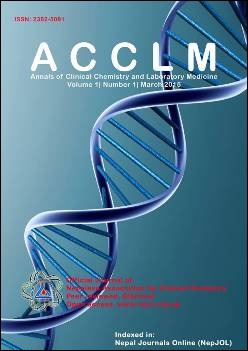A cross-sectional study of lung functions in traffic police personnel at work in Kathmandu Valley, Nepal
DOI:
https://doi.org/10.3126/acclm.v1i1.12315Keywords:
Traffic Police Pulmonary Spirometer Air FunctionAbstract
BACKGROUND: The present study was aimed to assess pulmonary functions in the traffic police personnel (TPP) posted on traffic duty in Kathmandu valley, Nepal.
METHODS: The study group consisted of 17 females and 89 males, constituting 16% and 84% of the total police personnel studied, respectively. In the control group of 25 individuals, 16% (n=4) were female and 84% (n=21) were male. Portable desktop spirometer was used for the pulmonary function test (PFT) measurements.
RESULTS: It is seen that in females as compared to males, PFT parameters show a significant decrease. One-way ANOVA conducted to compare the effect of duration of air pollution exposure showed that there is a significant variation in PFT parameters among the groups. The exposure duration has significant effect on the PFT parameters.
CONCLUSION: Greater the officers are engaged in traffic duty for years, greater is the decrement in their lung functions test.
DOI: http://dx.doi.org/10.3126/acclm.v1i1.12315
Ann. Clin. Chem. & Lab. Med. 1(1) 2015: 42-48
Downloads
Downloads
Published
How to Cite
Issue
Section
License
Authors who publish with this journal agree to the following terms:
- The author transfers copyright to the Nepalese Association for Clinical Chemistry.
- The journal publishes the work under a Creative Commons Attribution License that allows others to share the work with an acknowledgement of the work's authorship and initial publication in this journal and under the same share-alike license used here.
- Authors are able to enter into separate, additional contractual arrangements for the non-exclusive distribution of the journal's published version of the work (e.g., post it to an institutional repository or publish it in a book), with an acknowledgement of its initial publication in this journal.
- Authors are permitted and encouraged to post their work online (e.g., in institutional repositories or on their website) prior to and during the submission process, as it can lead to productive exchanges, as well as earlier and greater citation of published work (See The Effect of Open Access).




